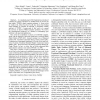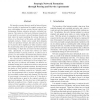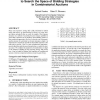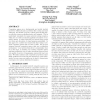54 search results - page 10 / 11 » On the Complexity of Nash Equilibria of Action-Graph Games |
FOCS
2009
IEEE
14 years 2 months ago
2009
IEEE
— In a landmark paper [32], Papadimitriou introduced a number of syntactic subclasses of TFNP based on proof styles that (unlike TFNP) admit complete problems. A recent series of...
FOCS
2006
IEEE
14 years 1 months ago
2006
IEEE
We introduce a game theoretic model of network formation in an effort to understand the complex system of business relationships between various Internet entities (e.g., Autonomou...
GECCO
2005
Springer
14 years 1 months ago
2005
Springer
Many non-cooperative settings that could potentially be studied using game theory are characterized by having very large strategy spaces and payoffs that are costly to compute. Be...
ATAL
2007
Springer
14 years 1 months ago
2007
Springer
Agents engaged in noncooperative interaction may seek to achieve a Nash equilibrium; this requires that agents be aware of others’ rewards. Misinformation about rewards leads to...
WINE
2009
Springer
14 years 2 months ago
2009
Springer
Congestion games are a fundamental and widely studied model for selfish allocation problems like routing and load balancing. An intrinsic property of these games is that players ...




